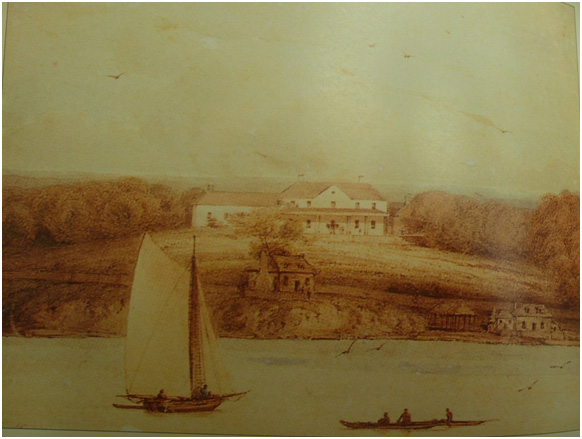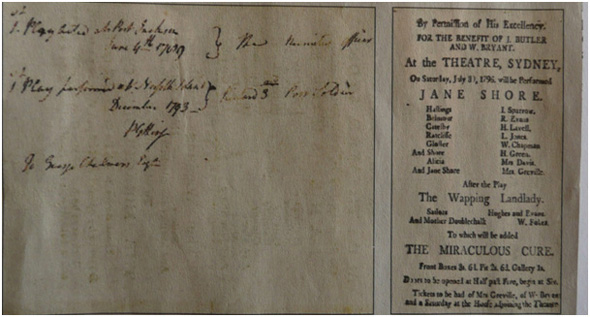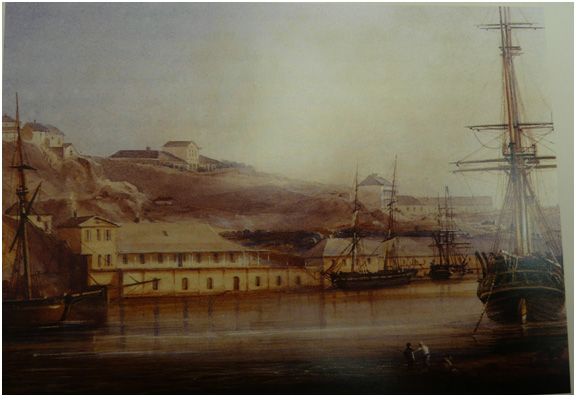
Chapter 6 Tidying Up Loose Ends
6.3 Governor King's farewell dinner to Baudin's expedition.
I am looking about this reception room at my official residence, Government House, waiting to formally farewell the French discovery expedition. I find it rather wearying, and yet! I can feel the excitement in the air with the diverse persons who are in attendance. Everyone wants to chat, explain and impress with their particular achievements.
This reception brings back fond memories of when I dined with the French expedition leader Captain La Pérouse, in Botany Bay, aboard his ship. That was only a few weeks after we had started the Colony at Port Jackson under the command of Captain Arthur Phillip in 1788. La Pérouse then sailed off, and disappeared forever.

Government House, Sydney. SLV.
That blasted piccolo player in the band is irritating me with his attitude. I see him and hear him constantly. Be it simply raising or lowering our flag, at official functions or at social events. I don't know if he is saluting me and playing to impress me, or being rude to me in his playing. I have complained about the drummer's disrespect to me in sometimes beating two ruffles on his drum instead of one, whenever I take the royal salute. His officer, Ensign Bailey, has committed an irregularity in allowing it.
Why can't the band play more of that composer Wolfgang Mozart's music, or some of the tunes played at the plays, instead of always marching forever. I appreciate the bosun's pipe calls more than I do their playing.
My duties as Governor and Commander in Chief representing His Majesty the King and the British Government are very demanding indeed. I am always tired. I have incessant paper work. Answering demanding letters from government officials. Not only from Britain, but here at Sydney. I have to keep planning the Colony's continued existence and future growth. I am pushing, always having to push exploration of this new land with limited manpower and other resources; forever looking to future defence requirements for Britain, following orders and requests from the Colonial Secretary.
It is also my duty to attend to the requirements of the free settlers, to the convicts and their pardons, punishments and rewards. I find that I am always devising ways to keep the Colony from starvation.
My biggest battle is trying to curb the growing power of the NSW Corps, with their illegal rum trade and illegal free use of convict labour. This situation developed in Governor Hunter's time, and has now got completely out of hand.
I am going to have to upset my old friend Bill Paterson, my Lieutenant Governor and Corps commander, by insisting he commands all his officers when this last crop on their farms is harvested, to return to full-time regimental duties in the Colony. They must also return the convicts whom they have used without payment either to the Crown or to the convicts themselves. The officers are here to serve the interests of the Crown, not to fill their own pockets.
I am going to spend less time being polite to the ladies tonight, other than some of the charming ladies, whose play presentations I have thoroughly enjoyed. I am hoping to have several minutes together with George, Bill Paterson, John Murray, Francis Barrallier and Pierre Milius with Leon Brevedent. I want just to relive for a moment some of the difficulties and happy, successful times in some of their journeys. It will help bring to mind some of my own experiences, and maybe suitably impress my very young son Philip Parker King. If only his elder brothers, Norfolk and Sydney, were here also. All my sons were born on Norfolk Island, when I was either Commandant of the first settlement, or a little later as Lieutenant Governor.
What a great pity Matthew and his younger brother Samuel are not here also. They are employed in circumnavigating and charting this vast land. The young men here remind me of myself when I was younger. Hopefully they are strong and fearless!

Theatre was alive and well in Sydney Town in 1796. Found in some papers relating to Australia in Canada. Given to the Australian Government in 2008 by the Canadian Government.
Now I can see my aide-de-camp Francis Barrallier, helping marshal the French contingent in the entrance foyer. I wonder how he feels having to talk to persons who outwardly support Napoleon Bonaparte and the French Revolution.
It is a great pity after all the wonderful explorations and map drafting he has carried out for me. I will have to dismiss him from my service. Unfortunately some of his nasty fellow officers, who are seeking to reduce my power to eliminate the rum trade, and humiliate me in the process, have drawn him into repeating in public various private comments my wife has made about her dear friend Mrs Paterson. This has damaged my relationship somewhat with my friend Bill Paterson. My household retainers and servants should be extremely loyal to myself and family.
There stands my friend, Commander Baudin, the expedition leader in charge of the Géographe. His second-in-charge, Captain Hamelin of the Naturaliste, is standing alongside him. Indeed I have seen Commander Baudin most days. We share many interests and have the common bond of being serving officers in our respective navies.
Somewhere in their group will be Mr Faure, the very gifted and accurate geographer. I did enjoy reviewing his charts with him, and appreciated his thoroughness. Mr Péron, the one-eyed former soldier, is also present. Péron is a gifted and possessive naturalist, zoologist and painter, who I suspect is not above carrying out some spying activities for his Government. After all, he has been loudly praising the current state and development of our Colony, and suggesting France should do the same. Apart from being fascinated with Bill Paterson's horticultural, flora and fauna efforts, he has convinced various merchants and officials of the Colony to show him parts of the countryside.
Pierre Milius will be there also. He is probably feeling embarrassed for vehemently attacking Commander Baudin's leadership of the expedition in front of Baudin and myself. He has since written to me and Commander Baudin to apologise for his outburst. I feel it was brought about by his being consistently ill throughout the entire voyage, and he will now have to stay in Sydney until he is better, then make his way to Isle de France.
Milius will probably bring young Leon Brevedent with him. Brevedent is going to sail as First Lieutenant under Freycinet on the Casuarina, the small cutter I allowed the French to purchase from the Colony. They wish to send the Naturaliste immediately home to France with all the scientific discoveries, zoological items, notes and paintings, so they need a small support ship to continue the other aims of the expedition with the Géographe. I believe there are at least 33 large packing cases to be shipped.
My wife is standing to my left, and to her left stands Colonel Bill Paterson, feeling well now that his duelling wounds have mended. His wife stands to his left. After that, the noteworthy officials of Sydney, with their wives and our ever-growing group of landowners and merchants.
Mr. Grimes the Surveyor-General is talking with that splendid and rather special person George Bass and his business associate Mr Bishop. I am so pleased that I was able to introduce George to some of the enlightened French officers and scientists.
The Reverend Mr Marsden and Mrs Marsden are talking with Mr Palmer and that French colonist Mr Larra. I hope Mr Larra has not been encouraging the French in any way. I do not see Doctor Balmain yet. Thank heavens that horrible, troublesome blackguard Captain Macarthur is not present. After his duel with Bill I arrested him and sent him back to England to be court-martialled.
Lieutenant Murray is also talking to some of the French. He is one of my favourite men. Always grateful to me for his promotion, always ready to follow my orders to the letter. Indeed the Colony owes him a great deal. Particularly with discovering that bay to be now called Port Phillip, charting it and other parts of Bass's Strait. Unfortunately for the man, my promotion of him will not be accepted by the Admiralty. Something to do with his proof of serving the appropriate time and promotions. It will mean demoting him, and probably destroying him.
Whilst I have become very friendly with Commander Baudin, I do have some reservations about the overall French aims. During their stay he, officers and scientists sought comfortable lodgings ashore. I have allocated land to the French at Bennelong Point alongside the plot I gave to Matthew Flinders, so that they may construct some officers shore dwellings. I have also helped the French, and have given free and sometimes charged for colony stores that could affect our capacity to survive; nevertheless two nasty incidents between the French and officers in the Colony that I had to resolve have made me determined that I will despatch a navy ship to follow the French when they sail for further exploration in our waters, to ensure they do not claim any part for France.
I should also record the friendliness of our people, including my own wife, in calling upon certain French officers and taking them on carriage rides and generally entertaining them in a civilised manner, with dinners and a ball. Indeed Commander Baudin has generously donated money for my wife's school for orphaned girls. The friendliness of farmers, fisher folk and merchants has allowed the French to see our settled land and gain some understanding of our economy and defences.

Sydney was becoming a prosperous colony. SLV.
It is time for some of my people to put behind them the nasty incidents, which I believe were not intentional.
The first nasty incident was when the Naturaliste hauled up recognition flags during a French celebration. They did not place the British flag where British ships fly it. The Harbour Master regarded it as an insult to the King. It took several letters between us and the French to clear the matter up. It was not intended as an insult-they have different customs.
When I had Murray aboard the Lady Nelson, take me and my official party to the Naturaliste, so that I could board her and welcome them, we were not entirely sure whether a peace treaty had been signed between France and Britain, or if we were still at war. I inspected their passports and found them authorised by the British Government to sail in British waters because theirs was a scientific expedition. They were aware that Lieutenant Matthew Flinders also possessed a passport authorised by the French Government because of his scientific surveying and exploration.
Indeed Matthew had gone alongside the Géographe in a place called Encounter Bay some several hundred miles to the west of Western Port. He, with Robert Brown, the naturalist attached to his ship and who spoke French, went on board the French ship and discussed his maps with the French officers. Mathew had also discussed his maps with Captain Hamelin and officers and crew here in Sydney, when they arrived without Commander Baudin and the Géographe.
Matthew and I were surprised when the Naturaliste sailed from Sydney for Isle de France without waiting for Commander Baudin. Then after Commander Baudin had arrived at Sydney, the Naturaliste returned to Sydney to be reunited with the other ship.
Matthew has pointed out to me and others various errors that the French have made. Although I suspect that the individual work of Mr Faure would be beyond reproach. Mathew enjoyed inviting aboard his ship the Investigator Commander Baudin and Captain Hamelin, as well as Péron and other officers. Bill Paterson also attended.
The second nasty incident concerned liquor. I issued orders that no member of the Officer Corps could continue their sole right to buy and sell liquor arriving in the Colony. The officers resent the order and wish me harm. When the Atlas arrived in Sydney, I refused the Captain permission to land her large cargo of spirits. I did not include the French in this ban, and I allowed Commander Baudin to purchase 800 gallons of brandy from the Atlas to replenish his ships.
Captain Kemp of the Officer Corps later alleged that the French had sold some of this liquor ashore. I have no doubt Kemp made the allegation to discredit me in the eyes of my superiors in London and to force me to rescind my order. Kemp deliberately made the allegations public by questioning on the parade ground the source of his information, an ex-convict named Chapman, who claimed that he had purchased spirits from two officers of the Géographe, Mr St Cricq and Louis Freycinet.
Those French officers satisfied the Harbour Master, Mr Harris, and Commander Baudin that they paid for fresh vegetables, out of their own ration of liquor that they had saved up. It was an allowable transaction. Captain Kemp had no choice than to write an apology to the French. The French then declared their honour satisfied.
Enough of these bad recollections. I must write to Sir Joseph Banks soon, and inform him of progress in matters he has taken a very strong interest in.
Previous Chapter | Chapter Selection | Next Chapter | Download Chapter